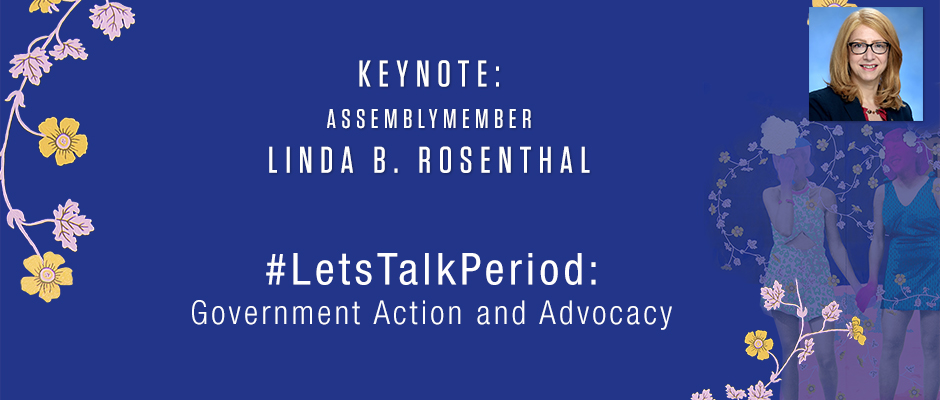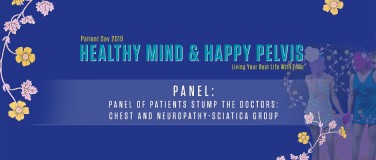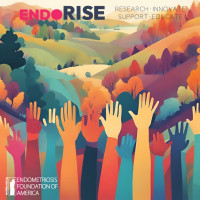Linda Rosenthal - #LetsTalkPeriod: Government Action and Advocacy
Patient Awareness Day 2019: HEALTHY MIND & HAPPY PELVIS
Living Your Best Life With Endo
March 10, 2019 (8am - 5pm)
Einhorn Auditorium, Lenox Hill Hospital, New York City
https://www.endofound.org/patientday/2019
Hi, everyone. I'm Assembly Member Linda B. Rosenthal. I represent the Upper West Side and parts of Hell's Kitchen in the New York State Assembly. I've been an assembly member for 13 years, and it's a great privilege to be here with you today. And it's quite an honor, and I thank you for inviting me. First, I'd love to thank the Endometriosis Foundation, all of its founders, all of its patients, everyone involved today in this conversation. The fact that so many of you are in the same room today to talk about menstruation, periods, endo, is a remarkable testament to the progress that has been made. Although it does feel like progress is slow, I think that, with conferences like this and just mere discussion of everything involved with woman's biology, will help to remove the stigma and lead to greater research, progress, in this field.
One of the things I'm involved with, as an assembly member, is the broader push toward menstrual equity, and that is about pushing the conversation, confronting taboos and stigmas head-on when it relates to women's bodies and women's biological functions. The key to all of this is to move the conversation about menstruation into the mainstream. Tampons, periods, endo, all have to be taken out of the dark, into the light, where conversations can be had. Conversations are now only beginning, in earnest, around policy that are made possible by the advances in broader conversations. We all have a first period story or a worst period story, and you all know yours and you can share them if you think they're important.
But I'll tell you, when I first got my period, I didn't know a thing about what was going to happen to me, and so the first emotion was shame. Shame was not just in that one moment. It's in the context of a period experience that we have been taught and groomed to feel embarrassed by. It's a product of a lifetime of other people's experiences and their instruction to us on what will happen when you're 12 or 13. Today, we're taking an enormous step in reshaping that dialogue. Girls and women, young women, older women, are telling their stories of having gotten their periods, what it is like to be a menstruater, and we're working to strip the social, emotional barriers that, for so long, have shrouded the word "period."
The Menstrual Movement has swept the world in recent years. For example, in 2016, I passed the law to ax the tampon tax, which was kind of astounding when I and my staff were researching the law and we saw that tampons and pads, et cetera, were taxed, whereas Fruit Roll-Ups were not. And why was that? I tried to pass that in 2015, and I was told that the revenue that was garnered through taxing menstrual products was a key part of helping fill a budget hole. Like, "No, no, that's not happening." So, the next year, I pushed very hard, and we did get it passed. But when I spoke on the floor about it, I used words that would elicit a reaction, such as "blood" and "gush." It was pretty quiet when I was talking, but it's really something that everybody needs to confront because if that didn't happen, none of us would be here.
So, that's part of how we started this talk in New York, and many states still have a tampon tax, including California, where Governor Jerry Brown vetoed a bill to ax the tax for the very same reason, that they needed that money to fill a budget gap. That is not acceptable. It's a fundamental failure to even consider or accept that menstrual products are necessitated by our biology. So, now there are 10 states that have axed the tax, and we're working to get that done around the country. I've also introduced bills to require that menstrual products be provided free of charge in all public schools, and that is now a law. Sixth through twelfth grade, products in all bathrooms, and the most recent bill that the governor signed was to provide free products to people in prisons because, all too often, menstrual products were used as a tool to control people who are incarcerated and not as, "Well, you require this because of your biology."
So, in some ways, we're in the Dark Ages. You do see stories by girls and women in other countries, where they are banished to huts for a week during their periods. They can't be seen, they can't participate in life, and they typify the stigma around this issue. But that's not acceptable, and in a country like ours, we can't be content with the situation just to be where it is now, where it's still shameful, where it's still something you giggle about, where, if you leave the room in your class, you have to put it up your sleeve so that no one knows why you're going to the bathroom. And I see that as lead-in to the conversation about endometriosis, which I know so many of you have had to deal with all your lives, and I was thinking back to my best friend in high school.
And when she had her period, she was out for a few days. I couldn't talk to her. She was just in bed, nausea, vomiting, pain. She could not leave the house, and now, I think back and I think, "This was probably endometriosis." But no one had talked about that. No one had heard about that, and still today, as you know, 10 years til diagnosis, she probably went through menopause and was never diagnosed, considering the state of affairs. And that's why it's so good that you're all gathered here and discussing the issue. From my part, and this is with Senator Sue [Sorino 00:07:42], who will make an appearance shortly, I believe, we have a bill. We've introduced a bill, and that's one of the best ways that a legislator can affect change, is changing the law.
Behavior doesn't always come with the law change, but it sparks change and at least guarantees certain rights. So, this bill that I have, if anyone want to look it up, it's A484, and it directs the Commissioner of Health to develop informational materials concerning menstrual disorders for distribution in schools and to patients. So, I'm not sure that ... Back in my day, it was called hygiene. I'm not sure that menstrual issues are even taught in all the schools here in New York state, but we want them to be taught. And, frequently, the boys get their own little class, probably about boy biology, and the girls are in another room, taught about the vicissitudes of periods, but actually, endo is not mentioned.
And without education, how are we going to proceed with making this just a regular disease the way people talk about, "I got a new hip," "I broke my shoulder," "I have IBS?" Even people talk about cancer much more freely these days, but endo still feels like it's kind of in the dark. So, I think, by introducing this bill and having discussions ... That's part of when you introduce a bill. You can educate your colleagues about this issue, and then they can go on and educate the people in their districts and become advocates. And that's how you spread the word about something important.
So, this bill would require informational materials concerning menstrual disorders, in conjunction with the Commissioner of Education, age-specific information materials to ... provided to school districts and healthcare practitioners, and the materials shall include timing, signs, and symptoms of endometriosis, the importance of menstrual health and its impacts on one's physical, emotional, social, and academic life, basic statistics on endometriosis and other menstrual issues, best practices on how to be one's own healthcare advocate, and basic treatment options for endometriosis, as well as recommendations for follow-up care from a healthcare provider.
Now, I was speaking to some of the wonderful surgeons here, and they didn't learn much about this in med school. So, maybe I have to do a bill about that. I did actually pass a law some years ago that said doctors had to take a course on prescribing opioids because most of the doctors did not know the severity of the addiction for some people, so the AMA, everyone, battled against that bill. But I did get it passed, and it is law now. And doctors have said, "Wow, this a great course. I wish I'd known this earlier," and I think the same thing could happen with endo. I mean, you have devoted doctors know. I've met some of them. I talked to some of them, but we need to make sure that is information is spread throughout the medical community and also the people who suffer from endometriosis because they're the ones ... and I'm sure many of you here are the ones ... who've had to suffer in silence, being told, "Well, you're just anxious. It's psychosomatic," the way women are often told about their symptoms, that it's all in their heads.
Then, you don't get treatments developed. It can just ruin people's lives, and I don't want to see that. I feel like sometimes legislators can make a difference and make a change, and this is certainly one of the cases where we can dispel the stigma, get more research dollars, which is always important. And some diseases have very high profiles and get all the research dollars, and I think we also have to advocate ... and I will advocate ... for more dollars to study this because, then, we can come to better conclusions, better treatments for people. I think, as a woman legislator, we view things a little differently than men in numerous areas, and I think that fact that we're behind on endo, we're behind on menstrual disorders, we're behind on smashing the stigma because women have not been part of the governing structure in Congress, in state, and local levels.
And with more women in government, we're going to be able to focus on issues that relate to women that men don't experience and, therefore, have no motivation to do anything about 'cause they just don't know. It's not a criticism; it's just a fact, and so, I've gotten a lot of my colleagues, female colleagues and some men, to understand what happens when girls get their periods, when they don't have access to menstrual products. And now I will talk to them more about endometriosis, how some of their loved ones may be suffering with it and not even know that they have it, and that there are options for them. That's the most resounding message, I think, that there are options for people who are going through endo, and they don't have to suffer in silence and that there is a body of scientists and people working to help them, to help them get through it, and to help them live dignified, wonderful lives, even if they have endo.










